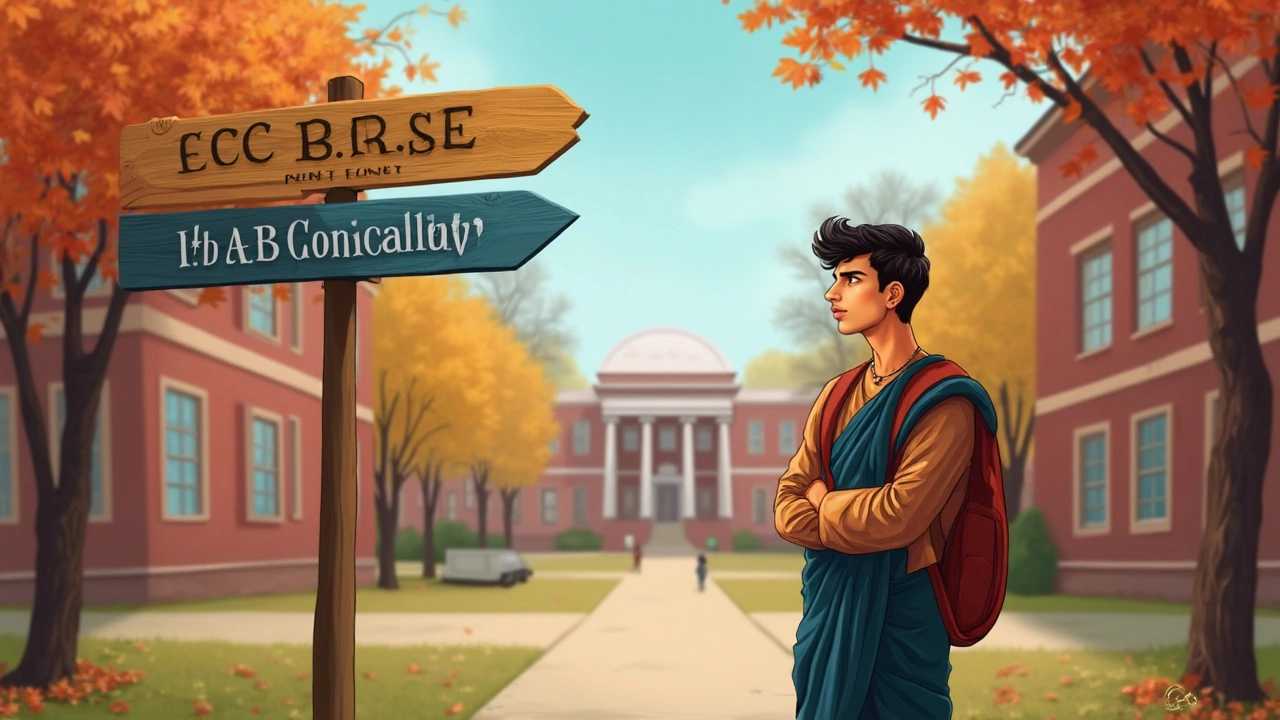Applying to Harvard from India can feel like a shot in the dark if you’ve only ever heard about the CBSE board and have no clue if the world’s top universities—including Harvard—take it seriously. Here’s the deal: Harvard absolutely does consider CBSE students. Your CBSE marks aren’t some random numbers to them. They’re looking at your results, your rank, and the school’s overall reputation.
You don’t need to switch to an international syllabus or shell out lakhs for IB just to get in the running at Harvard. In fact, every year, brilliant students with plain-vanilla CBSE credentials make it to the Ivy League. So if you’re sweating over whether your Class XII CBSE grades will count, don’t—they do. But Harvard’s not just about numbers. Test scores, essays, recommendations, and your extra-curriculars are all part of the mix. CBSE is your launchpad, not the whole rocket.
- Harvard’s Take on CBSE Board Results
- CBSE vs Other International Qualifications
- Essential Application Tips for CBSE Students
- Real Stories and Success Strategies
Harvard’s Take on CBSE Board Results
Harvard doesn’t sideline Indian applicants just because they’re from the CBSE board. In fact, Harvard admissions officers regularly review CBSE results as part of their standard process for Indian students. They recognize CBSE as India’s national curriculum and consider it on par with major educational systems around the world.
What Harvard wants to see from CBSE students is strong academic consistency. It’s not about topping the boards—though that never hurts—but about showing steady, excellent marks from classes IX through XII. School rankings matter less than your individual performance and what you do with the opportunities available to you.
Harvard’s website says they don’t have a minimum cut-off for marks or board examinations, but almost all admitted students have excellent academic records. The admissions team understandingly gives some wiggle room knowing that CBSE exams are known for tough evaluation and tight marking. So if you’re worried that a 92% in CBSE isn’t “as good” as a 95% in another system, relax—Harvard gets it.
A key thing most applicants miss: you’ll need to submit your official mark sheets (typically from classes IX through XII), and they need to be translated into English if they aren’t already. Sometimes Harvard might ask your school for extra details on the syllabus or grading system, especially if something seems confusing.
- Send scanned copies of your mark sheets—especially final board results.
- Mention awards or special recognitions you’ve earned in school reports or recommendations.
- If your school offers additional context (like ‘top 1% of class’ written on the transcript), absolutely include it.
So yes, you can land in Cambridge, Massachusetts, straight out of a CBSE classroom. What matters most is how you show your strengths, consistency, and growth over your high school years.
CBSE vs Other International Qualifications
When Indian students look at places like Harvard, they often wonder how the CBSE stacks up against boards like IB (International Baccalaureate) or A-Levels. Here’s the bottom line: Harvard accepts students with all these backgrounds. There’s no official preference, but there are some real-life differences you should know about.
CBSE is recognized by Harvard just like IB and Cambridge A-Levels. In fact, lots of admitted Indian students come from CBSE. The main difference? Rigor and style. IB and A-Levels focus more on projects, essays, and ongoing assessment. They want you to think critically and argue your case. CBSE, on the other hand, leans more on final exams and memorization. It’s not worse—just different.
One thing to remember: Bragging about your CBSE marks only gets you so far if you’re aiming for Harvard. Your board percentages might look sky-high, but admissions officers are used to people from 50+ countries with wildly different grading. That’s why they look at things like SAT/ACT scores to level the playing field.
| Qualification | Typical Grading Style | What Harvard Looks For |
|---|---|---|
| CBSE | Final board exams, percentage scores | Top grades, context from school, external test scores |
| IB | Coursework + exams, 45-point scale | High marks, depth in Extended Essay, Theory of Knowledge |
| Cambridge A-Levels | Subject-based, letter grades | Strong predicted grades, subject rigor |
Think IB and A-Levels give an edge? Here’s the truth: Harvard wants proof that you challenged yourself and made the most of what your school offered. They want to see that if your school was strict and offered only CBSE, you aced it and got involved outside class too. If you’re applying from a CBSE school, highlight leadership roles, science fairs, social work—stuff that shows you’re more than just exam results.
And don’t stress over not having fancy IB or international coursework. Harvard has admitted plenty of students with just strong CBSE backgrounds. Focus on what you can control: your Harvard application, your essays, and your passion for learning.

Essential Application Tips for CBSE Students
Getting into Harvard as a CBSE student isn’t about showing off a perfect report card—Harvard wants to see the whole picture. If you want your application to stand out, you’ll need to pay attention to a few key things.
- Your CBSE Scores Matter, But Context Helps: A high percentage grabs attention, but don’t panic if your scores aren’t 98+. Harvard looks at what’s considered “good” at your school and compares you with peers. If most students score in the 80s and you’re topping the class, that’s a big plus.
- Send Predicted and Final Scores: If you’re in Class XII, give your school’s predicted results along with Class X and XI marks. Later, send your final board marks if you get in.
- Standardized Tests Are Still a Thing (For Now): Even though some US schools dropped SAT/ACT tests, having a solid score boosts your application, especially for Indian students. It shows you’re ready for tough academics.
- Get Real with Extracurriculars: Harvard looks for impact outside class. If you led your school’s science fest, built a community app, or played at a national championship, flaunt it. Quality beats quantity every time.
- Letters of Recommendation: Pick teachers who’ve seen your growth, not just someone with a fancy title. A physics teacher who knows how you bounced back from low grades can write a killer letter.
- Don’t Skip the Essays: The real Harvard test. Be honest, specific, and show a slice of yourself they won’t find anywhere else in your file. Forget trying to sound impressive—show who you really are.
Here’s a quick look at the typical profiles of CBSE students who made it to Harvard in the last few years:
| Profile Point | Common Achievement Level |
|---|---|
| Class XII CBSE Marks | 92% and above (top 5% of class) |
| SAT/ACT Scores | SAT: 1500–1580, ACT: 34–36 |
| Extra-curriculars | State/National level sports, published research, significant volunteering |
| Essays | Personal, focused on growth or challenge |
One last tip—start early. Most Harvard admits worked on their applications for months, not weeks. Talk to recent admits on social media, find mentors, and don’t get overwhelmed if your path isn’t typical. CBSE students have done it, and so can you.
Real Stories and Success Strategies
Let’s talk about what really matters: how actual students from the CBSE board made it to Harvard. You might have heard about Anjali Sud, the former CEO of Vimeo—she studied under the CBSE system in India before attending Harvard Business School. Or take the case of Radhika Kannan, from Tamil Nadu, who aced her CBSE exams and went on to earn a Rhodes Scholarship and later attend Harvard for graduate studies. These folks didn’t have glossy international diplomas. They had strong academics, grit, and a plan.
So, how did they pull it off? First, they did more than score well in board exams. They showed leadership, got involved in clubs or started their own projects, and worked on real-life problems. Harvard looks for students who stand out, not just on paper, but also through what they actually do after school hours.
Here’s what successful CBSE candidates usually have in common:
- Top grades in their board exams, especially in their main subjects.
- Excellent scores in standardized tests like the SAT or ACT. Harvard still pays close attention to these.
- A killer application essay that brings out personality, obstacles overcome, and what makes them unique.
- Strong recommendation letters—often from teachers who know them well, not just school principals going by routine templates.
- Passion projects or extracurricular activities. Harvard has picked students who started environmental clubs, led robotics teams, or even coached junior classmates.
There’s a lot of noise online about needing to be a super-genius or have a ton of privileges, but that’s not the whole story. What sets applicants apart is initiative. Many Harvard alums with a CBSE background talk about how they chased real interests: starting a YouTube channel to teach math, running fundraisers, representing India at international science fairs—stuff that mattered to them, not just activities to pad applications.
One more thing: CBSE students have to pay extra attention to the differences in grading scales compared to American systems. So, always include a clear, official explanation of your grades in your application. Make it easy for Harvard’s admissions team to see why your marks stand out, and don’t hesitate to ask your school for official documentation or a letter from your school counselor.
Bottom line, if you’re coming from CBSE and dreaming big, you’ve got a shot—if you mix strong academics with passion, authenticity, and clear communication.
